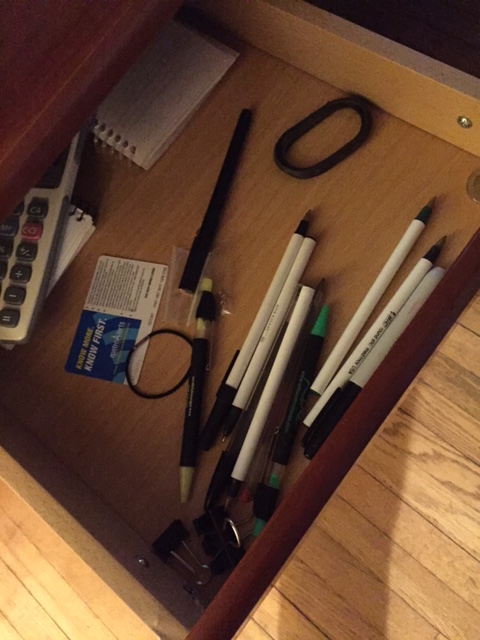 I spent part of my day yesterday clearing out my desk drawers of accumulated old paid bills and papers from the last couple years. In the beginning, I felt energized and full of resolve, sorting papers into category piles to help me decide what I need to recycle and what I need to keep. Pretty quickly into the sorting, however, I started feeling overwhelmed, discouraged, and indecisive about what should go where (by year, or by another criterion?) and whether to keep an old document ’just in case’.
I spent part of my day yesterday clearing out my desk drawers of accumulated old paid bills and papers from the last couple years. In the beginning, I felt energized and full of resolve, sorting papers into category piles to help me decide what I need to recycle and what I need to keep. Pretty quickly into the sorting, however, I started feeling overwhelmed, discouraged, and indecisive about what should go where (by year, or by another criterion?) and whether to keep an old document ’just in case’.
This time, instead of attempting to push through the feelings and keep going, which is what I would normally do, I paused and just sat with myself. I stayed with the feelings that were coming up, not letting them completely sweep me away but being with them, like a friend patiently wanting to hear more.
Underlying the overwhelm was a feeling of fear that life is unsafe, and that I need to hang onto these pieces of paper that in the future may prove my identity to outside authorities like the IRS or BlueCross. I recognize that some of this fear is valid, we do need to hang onto certain documents to verify our identities in the world.
But I realized, as I got up and made myself a cup of tea for comfort, that this fear of a dissolving identity has deeper roots. I have been writing a scene in my memoir from when I was 11 years old and coming to terms with the reality of my family structure dissolving and reforming. My parents were in the process of separating. I spent my eleventh summer alone with my grandparents, watching the fragility of their increasing age, and their differences and difficulty in relating to each other.
The memory reminded me of the old panic of myself as a child, losing the safety and structure that my family had always provided. I am startled when panic still surfaces at moments like this, moments where I find I’ve tied my identity and sense of safety in the world to something variable and ephemeral, something I have assumed will last forever.
How strange that my feeling of vulnerability is so raw and intense, even after many years. I sat in my glider rocker for a while, rocking myself like a baby until I finished my tea and was ready to keep going with the papers. At the end, I didn’t feel euphoric, in fact I felt disoriented looking at the empty drawer before I put much less back inside. The empty feeling is uncomfortable and yet holds relief, a recognition that with each small gesture like this one, I have now made space for something new to emerge and surface in my life. I do like the budding sensation of momentum, and the sense of opening to possibility.
I would love to hear your stories of supporting yourself through vulnerable moments!
Cheers, Eliza